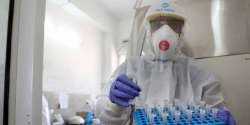Trinity College research finds why COVID 19 is to hard to treat
Study conducted at Trinity College Dublin suggests that a comprehensive look into COVID 19 suggests that it has a unique infectious profile

Researchers at the Trinity College Dublin showed that a comprehensive review into what we know about Covid 19 and the way it functions suggests that the virus has a unique infectious profile, which explains why it can be so hard to treat and why some people experience a long struggle with the virus, and even after the virus is technically out of the system, it leaves behind significant health effects.
Unlike 'low-pathogenic human coronavirus sub-species, this virus attacks both upper and lower respiratory systems. There is growing evidence to back the claim. The former, however, only affected the upper respiratory system causing symptoms that resemble a common cold. On the flipside, 'high pathogenic viruses like SARS and ARDS affected only the lower respiratory tract.
COVID-19 has evolved with a uniquely challenging set of characteristics. Its biggest shreds of evidence are frequent multi-organ impacts, blood clots, similar viruses, and an unusual immune-inflammatory response not commonly associated with these viruses.
While animal and experimental models imply an overly aggressive immune-inflammation response as a key driver, it seems things work starkly different when it comes to human bodies.
Inflammation still is a factor but the unique dysregulation of the immune response causes our bodies to mismanage the manner in which they fight the virus.
This explains why some people experience prolonged lung infection problems despite the virus leaving their bodies for months.
Ignacio Martin-Loeches, Clinical Professor in Trinity College Dublin's School of Medicine, said, "The emergence of severe acute respiratory syndrome coronavirus two (SARS-CoV-2) has resulted in a health crisis not witnessed since 1918 Spanish Flu Pandemic".
"Despite international focus on the virus, we are only just beginning to understand its intricacies. Based on growing evidence, we propose that COVID-19 should be seen as a new entity with a previously unknown infectious profile. It has its own characteristics and distinct pathophysiology and we need to be aware of this when treating people", he added.
(With ANI Inputs)